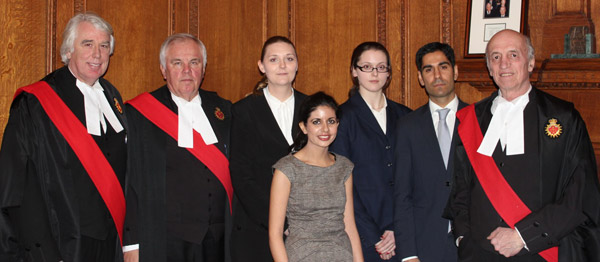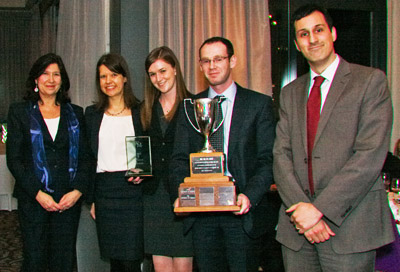By Sara Faherty, Assistant Dean, Office of the Associate Deans
Many congratulations go to the winners of the 17th annual Frank W. Callaghan Memorial Moot: Azeezah Kanji and Deirdre Bryant, who mooted in the final round against Meagan Jemmett and Anu Koshal, before Justices of the Superior Court of Ontario. All four finalists were coached by Chris Cairns and Graeme Deuchars. The Callaghan is organised and warmly supported by Professor Hamish Stewart.
Anu Koshal was the winner of the Top Oralist prize. The Second and Third Place Oralists were Hannah Freeman and Jonathan Tam. The winning Appellant Factum was written by Azeezah Kanji and Deidre Bryant. The winning Respondent Factum was written by Helen Cox and Hannah Freeman.
Distinguished speakers, such as the Honourable Roy McMurtry, spoke about the extraordinary advocacy of Frank W. Callaghan, and all of the mooters honoured his memory with their hard work and enthusiasm.
The Chief Justices of the moot and members of the Callaghan Committee extend their most sincere congratulations to all of the mooters for representing the faculty of law so spectacularly before members of the bar and bench. The Callaghan Cup will be on display in the Awards Case shortly.

At the Callaghan Moot, left to right: The Honourable Justice Brown, The Honourable Justice Then (Regional Senior Judge for Toronto Region), Deidre Bryant, Azeezah Kanji, Meagan Jemmett, Anu Koshal, The Honourable Justice McCombs. Photo by Aaron Rankin.
The U of T team, Elizabeth Bingham, Anisah Hassan, Lane Krainyk, and Sarah Yun, did very well in the Jessup Moot competition in International Law. Anisah Hassan was awarded the top oralist prize, as well as two other prizes arising from this placement. Overall, the team was 4-1-1 in oral rounds, meaning they won or tied 5 out of their 6 rounds. Our students mooted remarkably well, and their extensive preparation was evident in their command of the law, facts and policy considerations they presented in the oral rounds. Dera Nevin, their Adjunct Faculty Coach and Atrisha Lewis and Nate Read-Ellis worked hard preparing the team, and we are grateful to all the mooters and coaches for representing the Faculty of Law so skilfully.
Kudos, also to Jonathan Bright, Anna Cooper, Sameer Nurmohamed and Jakub Vodsedalek for their splendid performance representing U of T at the International Competition for Mediation Advocacy. This cross-cultural competition hosts law students, mediators, lawyers, and dispute resolution law faculty in an event designed to showcase a range of ADR-related skills, including problem-solving, case presentation, and advocacy. Our team proceeded through six preliminary rounds against a challenging slate of U.S., Canadian and Caribbean teams, winning the approval of seven judges and scoring up to 91%. Acting Assistant Dean Judith McCormack, who coached the team, praised the terrific job these talented students did in this new area of law.
Two teams from the U of T Faculty of Law participated in this year's Kawaskimhon Moot. Cliff Anderson, Justin Basinger, Jonathan Charland, Promise Holmes Skinner, Jay Potter, and Gillian Reiss went to this uniquely non-competitive event. Rather, the Kawaskimhon (which means "speaking with knowledge") focuses on negotiation, collaboration and open dialogue. The students were coached by Professor Douglas Sanderson and Bryce Edwards, and supported by Aboriginal Law Program Coordinator Lisa Del Col. Both teams made superb presentations on developing a process for dealing with the interpretation of historic treaties, and contributed greatly to the negotiations.
U of T also sent teams to another unique moot (though for completely different reasons). The Donald Bowman Tax Moot is the only competition on Canadian tax law, and Leo Elias, Atrisha Lewis, Alec Milne, and Sameer Nurmohamed made appellant arguments in a problem based on Her Majesty the Queen v. GlaxoSmithKline Inc. The moot judges included retired Tax Court Chief Justice Donald Bowman as well as several judges of the Tax Court of Canada and Federal Court of Appeal, and a number of experienced tax practitioners. Our mooters made it to the semi-final round, and Sameer Nurmohamed won the prize for Best Advocate. Amanda Heale, who coaches the team with Martha MacDonald and Ben Alarie, says that all four students should be very proud of their performance.
Congratulations to Jonathan Bright, Paul Davis, Stephen Holinski, and Michael Portner Gartke in their first place finish at the Davies Corporate-Securities Moot. In the lead-up to the finals, U of T was the only school to win all four of the preliminary rounds, guaranteeing U of T a place in the final. In an impressive final round against the University of Alberta, Steve and Jon presented oral arguments in front of a panel led by Supreme Court of Canada Justice Deschamps. The team also won the second place factum prize. This year's moot centred around hypothetical procedural missteps that took place during the wind-up of a subsidiary corporation where many of the subsidiary's directors acted both for the parent and a wholly-owned subsidiary. The team was ably coached by Emma Costante, Joe Ensom, Nathaniel Read Ellis, and Andrew Robertson and by their Adjunct Faculty Advisor, Andrew Matheson. The mooters also received significant assistance with their analysis from Professors Jeff MacIntosh and Anita Anand.
Cheers, too, to Peter Flynn and Sierra Yates Robart. After winning the annual BLG Client Consultation Competition in January, Peter and Sierra represented the University of Toronto at the National Client Consultation Competition in Ottawa. Teams from all across Canada competed in an intense 2 day tournament. Last year's winning students, Justin Nasseri and Daniel Goldbloom coached these two first year students.
The Faculty's Gale Moot team, consisting of Richard Lizius, Justin Nasseri, Josh Stark and Christine Wadsworth, did an incredible job, placing second at the competition. The problem was about the scope of 10(b) - the right to counsel - in the context of custodial interrogations. U of T Law was in the final, with Josh and Justin ably representing the team and arguing before a panel including Justice Cromwell of the Supreme Court of Canada. Toronto received uniformly high praise, with one of the Judges indicating that she wished that the Supreme Court had articulated their position in their judgment as well as one of our mooters. The team put countless preparation hours into the moot and it showed, with a number of Judges remarking on the incredible grasp of the facts and cases our team had. Our mooters were supported by two Faculty Mooting Advisors, Karen Bellinger and Michael Dineen. Ms. Bellinger reports that the two student coaches, Lauren Epstein and Jay Potter, "went above and beyond the call of duty and did a fantastic job all around."
For the second time, U of T sent a team to the Fox Moot on Intellectual Property. The mooters were Alex Wai, Christopher Langan, Renee Blais Fontaine, and Tim Crljenica. Mooting Advisor Andrew Shaughnessy says the foursome was "a true team, through and through," and that he is thrilled that Alex and Chris got through to the semi-finals and won the top factum prize. Mr. Shaughnessy was co-Advisor with Peter Wilcox, and the team was expertly coached by last year's mooters, Kenneth Raddatz and David Yi. Kenneth agreed with the moot's judges, who equated Chris and Alex's semi-final to a final. Alex insists the prize-winning factum "would not have been what it was without all of the guidance, help and feedback from the team so I see the award as a team effort more than anything else."
The University of Toronto Wilson Moot team (Jeremy Nemers, Hayley Peglar, Denise Cooney & Michael Sabet) took first place in this year's competition - the 20th anniversary of the Wilson Moot. Named for Madam Justice Bertha Wilson, this national moot explores issues of equality and s.15 of the Canadian Charter of Rights and Freedoms. The team placed first in both oral and written argument, with Michael Sabet as the second place individual oralist. Word from many of the judges was that the teams were exceptional this year; so, our students' victory is really something to celebrate.
Cherly Milne, who served as faculty coach together with Lorraine Weinrib, wrote, "I am particularly pleased with the result in the written argument, as the students worked especially hard on improving our faculty's standing in this part of the competition. Adrian Johnston and Akash Toprani did an exceptional job as student coaches."
<p > 
The Wilson Moot team with Justice Kathryn Feldman (left)
Laura Trachuk, the Adjunct Mooting Advisor of our Canadian Labour Arbitration team, reports that Akosua Matthews and Andrew Max, ably coached by Tim Hughes and Andrew Vey, were "amazing" in last month's competition. She reports that while they did not receive any formal prizes, our team members must have been impressive, as they both netted job offers the weekend of the competition. She concludes, "all in all a good weekend."
Daniel Goldbloom, Sylvie McCallum Rougerie, Nadia Sayed, and Emily Shepard had an excellent showing in the Laskin Moot. They were impressive for multiple reasons: Daniel and Emily advanced to the final round and pleaded before a panel including retired Supreme Court Justice Ian Binnie. Following the final round, Daniel and Emily were named the best pair. Emily finished in second place amongst the oralists while Daniel finished fourth. The U of T team took the third place factum prize for their written submissions. Coached by Adjunct Mooting Advisor Sarah Corman and two student coaches, Julia Lockhart and Jonathan Roth, these mooters spent the last few months learning immigration law and relatively obscure areas of administrative law while simultaneously polishing their oral advocacy skills. The Laskin's unique bilingual format gave all the mooters an opportunity to improve their second language, while Sylvie delivered all her submissions in French. The Laskin mooters warmly thank their coaches and all the faculty, alumni and practitioners who provided feedback on their written and oral while they prepared for this moot.
Congratulations, too, to Kate Southwell and Lauren Epstein for their outstanding work in the Arnup Cup Competition. The Arnup is a trial advocacy competition, and rather than writing facta and making appellate arguments, Kate and Lauren demonstrated discipline, preparation, and talent in examining and cross-examining witnesses, dealing with evidentiary issues, solving procedural problems, and making opening and closing statements to jury. Their coach, Adjunct Mooting Advisor Rob Centa, says that they were nothing short of phenomenal, and he could not be prouder of how they represented the Faculty of Law.


